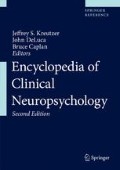Access this chapter
Tax calculation will be finalised at checkout
Purchases are for personal use only
References and Readings
Brandt, J. (1988). Malingered amnesia: Clinical assessment of malingering an deception. New York: Guilford Press.
Frazier, T. W., Frazier, A. R., Busch, R. M., Kerwood, M. A., & Demaree, H. A. (2008). Detection of simulated ADHD and reading disorder using symptom validity measures. Archives of Clinical Neuropsycholog, 23(5), 501–509.
Greve, K. W., & Bianchini, K. J. (2002). Using the wisconsin card sorting test to detect malingering: An analysis of the specificity of two methods in nonmalingering normal and patient samples. Journal of Clinical and Experimental Neuropsychology, 24(1), 48–54.
Grote, C. L., Kooker, E. K., Garron, D. C., Nyenhuis, D. L., Smith, C. A., & Mattingly, M. L. (2000). Performance of compensation seeking and non-compensation seeking samples on the Victoria symptom validity test: Cross validation and extension of a standardized study. Journal of Clinical and Experimental Neuropsychology, 22, 709–719.
Hiscock, M., & Hiscock, C. K. (1989). Refining the forced choice method for the detection of malingering. Journal of Clinical and Experimental Neuropsychology, 11, 967–974.
Loring, D. W., Lee, G. P., & Meador, K. J. (2005). Victoria symptom validity test performance in non-litigating epilepsy surgery candidates. Journal of Clinical and Experimental Neuropsychology, 27, 610–617.
Loring, D. W., Larrabee, G. J., Lee, G. P., & Meador, K. J. (2007). Victoria symptom validity test performance in a heterogenous clinical sample. The Clinical Neuropsychologist, 21(3), 522–531.
Miele, A. S., Gunner, J. H., Lynch, J. K., & McCaffrey, R. J. (2011). Are embedded validity indices equivalent to free-standing symptom validity tests? Archives of Clinical Neuropsychology, 26, 10–22. https://doi.org/10.1093/arclin/acr084.
Mittenberg, W., Patton, C., Canyock, E. M., & Condit, D. C. (2002). Baserates of malingering and symptom exaggeration. Journal of Clinical and Experimental Neuropsychology, 24, 1094–1102.
Sharland, M. J., & Gfeller, J. D. (2007). A survey of neuropsychologists’ beliefs and practices with respect to the assessment of effort. Archives of Clinical Neuropsychology, 22(2), 213–223.
Slick, D., Hopp, G., Strauss, E., Hunter, M., & Pinch, D. (1994). Detecting dissimulation; profiles of simulated malingerers, traumatic brain-injury pateints, and normal controls on a revised version of Hiscock and Hiscock forced choice memory test. Journal of Clinical and Experimental Neuropsychology, 16, 472–481.
Slick, D., Hopp, G., Strauss, E., & Spellacy, F. (1996). Victoria symptom validity test: Efficacy for detecting feigned memory impairment and relationship to neuropsychological tests and MMPI-2 validity scales. Journal of Clinical and Experimental Neuropsychology, 18, 911–922.
Slick, D. J., Tan, J. E., Strauss, E., Mateer, C. A., Harnadek, M., & Sherman, E. M. S. (2003). Victoria symptom validity test scores of patients with profound impairment. Nonlitigant case studies. The Clinical Neuropsychologist, 17, 390–394.
Sollman, M. J., & Berry, D. T. R. (2011). Detection of inadequate effort on neuropsychological testing: A meta-analytic update and extension. Archives of Clinical Neuropsychology, 26, 774–789. https://doi.org/10.1093/arclin/acr066.
Strauss, E., Sherman, E. M. S., & Spreen, O. (2006). A compendium of neuropsychological tests: Administration, norms, and commentary. New York: Oxford University Press.
Tan, J. E., Slick, D. J., Strauss, E., & Hultsch, D. F. (2002). How’d they do it? Malingering strategies on symptom validity tests. Journal of Forensic Neuropsychology, 2, 43–67.
Thompson, G. B., III. (2002). The Victoria symptom validity test: An enhanced test of symptom validity. Journal of Forensic Neuropsychology, 2, 43–67.
Vilar-Lopez, R., Santiago-Ramajo, S., Gomez-Rio, M., Verdejo-Garcia, A., Llamas, J. M., & Perez-Garcia, M. (2007). Detection of malingering in a Spanish population using three specific malingering tests. Archives of Clinical Neuropsychology, 22(3), 379–388.
Author information
Authors and Affiliations
Corresponding author
Editor information
Editors and Affiliations
Rights and permissions
Copyright information
© 2018 Springer International Publishing AG, part of Springer Nature
About this entry
Cite this entry
Hart, E.S. (2018). Victoria Symptom Validity Test. In: Kreutzer, J.S., DeLuca, J., Caplan, B. (eds) Encyclopedia of Clinical Neuropsychology. Springer, Cham. https://doi.org/10.1007/978-3-319-57111-9_2227
Download citation
DOI: https://doi.org/10.1007/978-3-319-57111-9_2227
Published:
Publisher Name: Springer, Cham
Print ISBN: 978-3-319-57110-2
Online ISBN: 978-3-319-57111-9
eBook Packages: Behavioral Science and PsychologyReference Module Humanities and Social SciencesReference Module Business, Economics and Social Sciences

